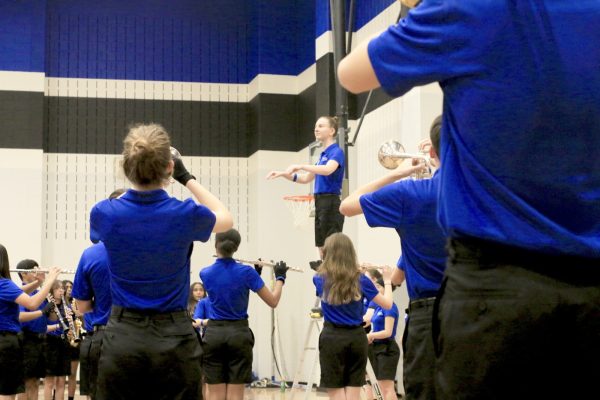Prevalence of vaping impacts students and administrators
The U.S. surgeon general declared vaping an epidemic among the U.S. youth population on Dec. 18, a little less than a month ago.
At Hebron, 83 of the 100 students surveyed at random during block lunch, considered vaping prevalent or very prevalent.
In the survey, 73 percent of students said vaping is a problem and 24 percent said it does not matter.
“I think [vaping] is fine outside of school, because you’re allowed to do whatever you want, but when you’re in school, you’re kind of affecting me,” junior Shruti Ada said. “So I think it’s a problem.”
Out of those who were surveyed, three percent said vaping is a good thing for reasons such as it is “better than narcotics” or the “lesser of two evils.”
“It’s very addicting, so it does have a stigma,” senior Claudia Thongdarom said. “It’s not a drug. It’s not a problem because a lot of people do it. It’s a good thing, because if you’re really addicted to cigarettes, than you can vape because vaping is better than smoking a cigarette. Vaping has no danger. I mean it can have a danger, but still, if someone is recovering from smoking a cigarette, then vaping is the thing to do.”
Because of the increasing prevalence of vaping, some of the bathrooms have been closed off, especially during block lunch.
“A lot of the student body gets annoyed but there’s only certain bathrooms open during block lunch,” officer Kevin Stiles said. “It’s because people are vaping, so it’s harder to watch 15 bathrooms, it’s easier to watch two or three.”
According to the survey, bathrooms and the features of an e-cigarette, such as the design and no smell of smoke, make it easy to conceal from unwanted attention; 73 percent of students thought it was easy to get away with vaping in school.
Stiles said the administration has had several cases a week of vaping recently. This year, there have been cases of THC oil found in student’s vapes according to Stiles and principal Scot Finch, which is a felony in TX.
Although vaping after age 18 is legal, smoking or vaping on campus, including the football stadium, is a felony.
“It comes down to people being able to control themselves with that, knowing that it’s something they enjoy doing,” Finch said. “But saying that, we’re not trying to make out people who smoke or vape to be evil. They’ve just got something they lack or they’re too addicted to it, so they end up doing it in school. Some people can’t wait.”
Along with the rising popularity of vaping, among youth, is a sort of vape culture featuring figures on Instagram and YouTube doing tricks with vapor or reviewing different products. Some celebrities are also involved in vaping, notably Katy Perry and Leonardo DiCaprio.
“It’s an art,” Thongdarom said. “Some people will vape and they will literally do some kind of tricks, and it’s so interesting. They do it for fun, they do it for YouTube videos, they make money off of it, and it’s really cool.”
Conversely, vaping can be also treated as a joke through the plethora of memes and parodies on the internet such Vape Nation, a comedic skit centered around vaping.
“I think most people treat [vaping] as a joke, but it should be taken more seriously because it’s not good thing to do because it can lead to other addictions,” junior Brendan Collins said.
Originally meant to help cigarette smokers quit, e-cigarettes have possibly taken an opposite role by getting a younger generation hooked on nicotine according to Newsweek. However, cigarette use itself is at its lowest because of increased awareness and health issues.
“Everyone knows cigarettes are bad for you,” junior Ally Horn said. “But back then, they didn’t know that and when it came out people just thought it was harmless.”
Although e-cigarettes are marketed as safer than conventional cigarettes according to the National Center for Health Research, they still contain nicotine, which is highly addictive. The long term health effects of vaping have not been determined according to John Hopkins Medicine.
“People know what the problems with cigarettes are, but people don’t know what the problems with vaping are because it’s a relatively new thing,” Collin said. “It’s like with any drug. People know that heroin is bad for them, but they’ve got to get their fix.”
Finch said vaping has been an issue among the student body; however, he doesn’t consider it an epidemic.
“I think you can only, unless they change their habits, try to slow it down or lessen it,” Finch said. “I’m not so naive to think we can fix it all because, once again, when you have an addiction, you want to engage in that addiction, even if you know it’s wrong. We will just keep doing what we can, knowing that we have students here and also staff who don’t appreciate that vapor.”

Senior Yasmin Haq is the editor-in-chief and this is her fourth year on staff. She dabbles in just about anything creative including writing, photography,...















